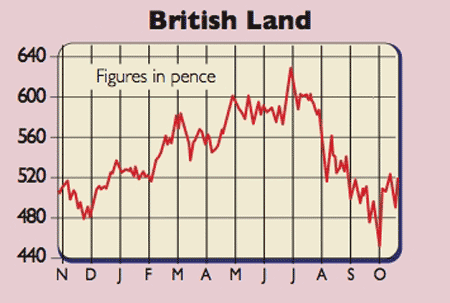Get the latest financial news, insights and expert analysis from our award-winning MoneyWeek team, to help you understand what really matters when it comes to your finances.
You are now subscribed
Your newsletter sign-up was successful
Want to add more newsletters?

Twice daily
MoneyWeek
Get the latest financial news, insights and expert analysis from our award-winning MoneyWeek team, to help you understand what really matters when it comes to your finances.

Four times a week
Look After My Bills
Sign up to our free money-saving newsletter, filled with the latest news and expert advice to help you find the best tips and deals for managing your bills. Start saving today!
British Land (LSE: BLND), rated a BUY by Jefferies
Mention commercial property at any dinner party, and many investors turn white during the 2008/9 credit crunch, real-estate prices plummeted 40%. However, there's been a mini renaissance sine then. According to Investment Property Databank, the average value of stores, offices and warehouses has jumped around 30% over the past 26 months. And factoring in rental income of 7% a year gives an annual yield of 8.7%. That beats cash returns hands down.
Better still, the rents charged by British Land, one of the UK's largest landlords, are relatively stable. Backed by top-flight tenants such as Tesco, Sainsbury's, Debenhams and UBS, it should be able to survive even the sharpest of downturns, just as it did three years ago. That's because its property portfolio is focused on prime locations (for example, Meadowhall Shopping Centre in Sheffield) and central London offices, which attract high-quality tenancies. Occupancy rates of 98% and average lease lengths (to first break) of 11 years are among the highest in the UK real-estate investment trust (REITs) spectrum. Overall, the retail to office split of gross assets is about 64:36.
MoneyWeek
Subscribe to MoneyWeek today and get your first six magazine issues absolutely FREE

Sign up to Money Morning
Don't miss the latest investment and personal finances news, market analysis, plus money-saving tips with our free twice-daily newsletter
Don't miss the latest investment and personal finances news, market analysis, plus money-saving tips with our free twice-daily newsletter
This all means British Land is able to borrow funds more cheaply than even several European governments. For instance, in September it raised $480m in a heavily oversubscribed bond issue, at an average of just 1.45% above the inter-bank rate. Total net borrowings were £4.6bn at the end of June and the firm can cover interest payments out of profits 2.3 times. Its average loan-to-value ratio is 45% and at an average cost of 4.8%. So why have the shares performed so poorly since the summer?

It is largely down to poor sentiment and overblown fears of another collapse in property values. UK retailers are downsizing in response to shrinking disposable incomes and a move towards online shopping. But there is no sign of this yet in the results, as the company's premium sites are enjoying robust demand. So I rate the stock on a one times net asset value of 583p a share. As a REIT, British Land incurs no corporation tax provided it pays out 90% of its profits, and dividends are distributed gross (yield 5%). So for income-seekers, the shares are tax efficient, especially if held within an individual savings account (Isa). Indeed, over the last 20 years, rent has accounted for 80% of total UK property returns.
Commercial property is not everyone's cup of tea. But if you are prepared to sit through the normal swings of the cycle, this stock looks a good bet. Interims are scheduled for 15 November. Jefferies has a price target of 611p.
Rating: BUY at 490p
Get the latest financial news, insights and expert analysis from our award-winning MoneyWeek team, to help you understand what really matters when it comes to your finances.
Paul gained a degree in electrical engineering and went on to qualify as a chartered management accountant. He has extensive corporate finance and investment experience and is a member of the Securities Institute.
Over the past 16 years Paul has held top-level financial management and M&A roles for blue-chip companies such as O2, GKN and Unilever. He is now director of his own capital investment and consultancy firm, PMH Capital Limited.
Paul is an expert at analysing companies in new, fast-growing markets, and is an extremely shrewd stock-picker.
-
 Should you buy an active ETF?
Should you buy an active ETF?ETFs are often mischaracterised as passive products, but they can be a convenient way to add active management to your portfolio
-
 Power up your pension before 5 April – easy ways to save before the tax year end
Power up your pension before 5 April – easy ways to save before the tax year endWith the end of the tax year looming, pension savers currently have a window to review and maximise what’s going into their retirement funds – we look at how